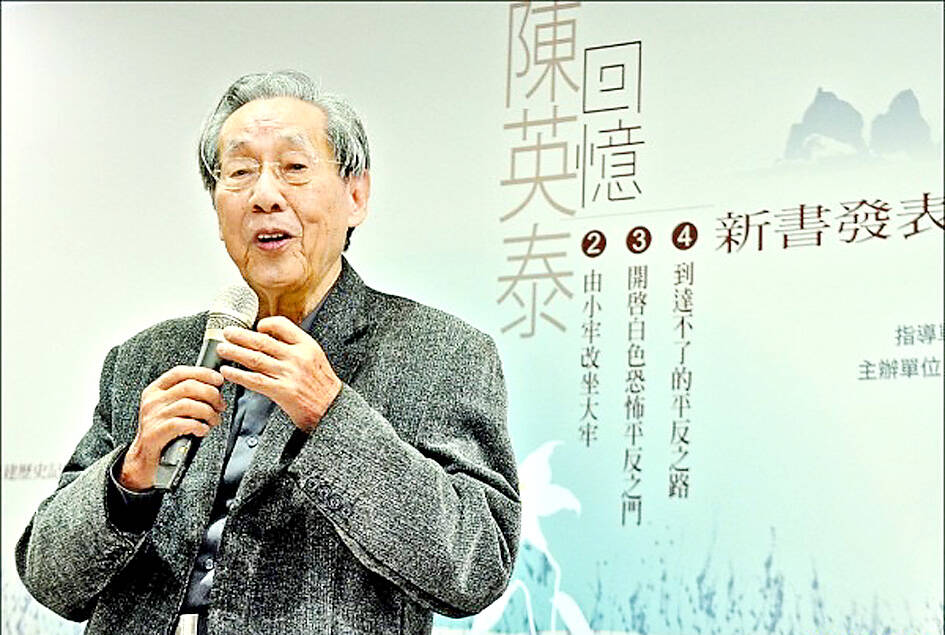White Terror-era political prisoner and human rights activist Tsai Kun-lin (蔡焜霖) died on Sunday at the age of 93.
Photographer Chiu Wan-hsin (邱萬興) said he was committed to “continue telling the tragic story of [Tsai’s life as] a political prisoner.”
Tsai was arrested in 1950 by the then-Chinese Nationalist Party (KMT) regime for joining a “left-leaning” reading club in high school. He spent years imprisoned at a “labor reform” camp on Green Island (綠島) after he was found guilty of rebellion and treason.

Photo: Taipei Times
The Economist Intelligence Unit, a research group associated with The Economist magazine, last year described Tsai as a living witness to Taiwan’s evolution from authoritarianism into a “full democracy.”
Tsai’s life was documented in a four-book Chinese-language graphic novel series titled Son of Formosa (來自清水的孩子) written by Yu Pei-yun (游珮芸) and illustrated by Chou Chien-hsin (周見信).
“Tsai was 30 years old when he was released from prison, and like many political prisoners at the time, his family never visited him while he was interned on Green Island,” Chiu said.
“Prison was hard for Tsai, who did not even know his father had passed away until he was released,” he said.
When he was younger, Tsai had a love of reading and singing, which made him a target of former president Chiang Kai-shek (蔣介石), who believed that the streets were full of spies and enemies, Chiu said.
Throughout his life, Tsai promoted democracy and human rights, Chiu said, adding that Tsai had attended an annual human rights-themed youth camp organized by the Dr Chen Wen-chen Memorial Foundation and Museum.
“Every stage of Tsai’s life is closely related to major social changes in Taiwan. He is the epitome of Taiwan’s modern history,” Yu said.
“He was drafted by the Japanese army at the age of 15, was one of the first political prisoners on Green Island, witnessed Taiwan’s economic miracle as one of the four Asian Tigers and saw the lifting of martial law,” she said.
When KMT government was expelled from the UN, national attention shifted to baseball, which Tsai had also been deeply involved in, she said, citing his role in founding the Hongye Little League baseball team in Taitung.
“Tsai also made important contributions to other cultural undertakings in Taiwan, such as founding the children’s magazine Prince (王子) and the women’s magazine Bella (儂儂),” Yu said.
“And he was responsible for the planning of a fine arts museum, and the publication of Taiwan’s first encyclopedia,” she added.
During Taiwan’s economic boom years Tsai helped design the advertisement for the country’s first domestically produced automobile, she said.
Tsai’s father committed suicide while Tsai was imprisoned, which left him with a sense of guilt and irreparable trauma, Slowork Publishing president and editor Huang Pei-shan (黃珮珊) said.
“Tsai only learned about his father’s death after he was released, and he was never able to get over it,” she said. “But I am happy that he could finally be reunited with his father in another world.”

The Grand Hotel Taipei on Saturday confirmed that its information system had been illegally accessed and expressed its deepest apologies for the concern it has caused its customers, adding that the issue is being investigated by the Ministry of Justice Investigation Bureau. The hotel said that on Tuesday last week, it had discovered an external illegal intrusion into its information system. An initial digital forensic investigation confirmed that parts of the system had been accessed, it said, adding that the possibility that some customer data were stolen and leaked could not be ruled out. The actual scope and content of the affected data

‘LIKE-MINDED PARTNER’: Tako van Popta said it would be inappropriate to delay signing the deal with Taiwan because of China, adding he would promote the issue Canadian senators have stressed Taiwan’s importance for international trade and expressed enthusiasm for ensuring the Taiwan-Canada trade cooperation framework agreement is implemented this year. Representative to Canada Harry Tseng (曾厚仁) in an interview with the Central News Agency (CNA) said he was increasingly uneasy about Ottawa’s delays in signing the agreement, especially as Ottawa has warmed toward Beijing. There are “no negotiations left. Not only [is it] initialed, we have three versions of the text ready: English, French and Mandarin,” Tseng said. “That tells you how close we are to the final signature.” Tseng said that he hoped Canadian Prime Minister Mark Carney

POSITIVE DEVELOPMENT: Japan and the US are expected to hold in-depth discussions on Taiwan-related issues during the meeting next month, Japanese sources said The holding of a Japan-US leaders’ meeting ahead of US President Donald Trump’s visit to China is positive news for Taiwan, former Japan-Taiwan Exchange Association representative Hiroyasu Izumi said yesterday. After the Liberal Democratic Party’s landslide victory in Japan’s House of Representatives election, Japanese Prime Minister Sanae Takaichi is scheduled to visit the US next month, where she is to meet with Trump ahead of the US president’s planned visit to China from March 31 to April 2 for a meeting with Chinese President Xi Jinping (習近平). Japan and the US are expected to hold in-depth discussions on Taiwan-related issues during the

President William Lai (賴清德) yesterday bestowed one of Taiwan’s highest honors on Saint Vincent and the Grenadines (SVG) Ambassador Andrea Clare Bowman in recognition of her contributions to bilateral ties. “By conferring the Order of Brilliant Star with Grand Cordon on Ambassador Bowman today, I want to sincerely thank her, on behalf of the Taiwanese people, for her outstanding contribution to deepening diplomatic ties between Taiwan and SVG,” Lai said at a ceremony held at the Presidential Office in Taipei. He noted that Bowman became SVG’s first ambassador to Taiwan in 2019 and